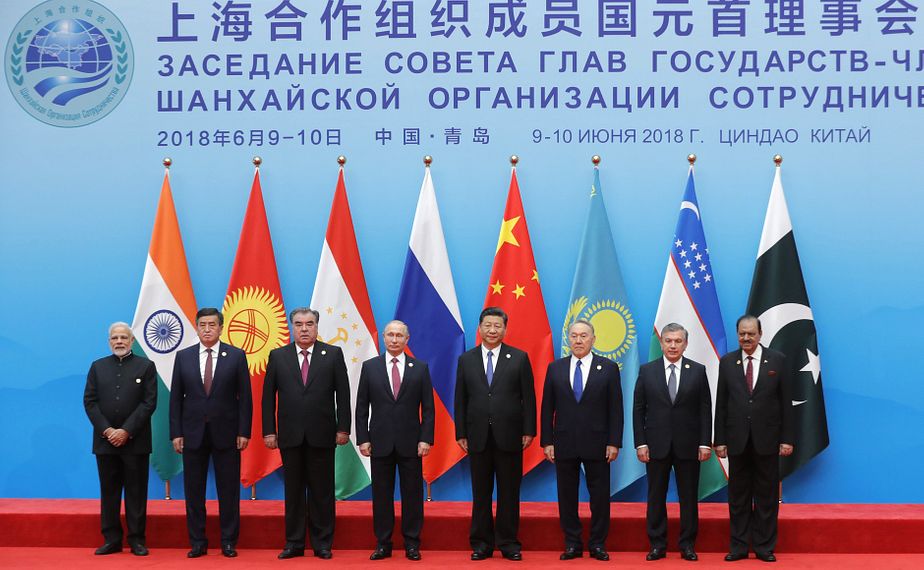The Shanghai Cooperation Organisation (SCO) met for its 21st annual conference on Friday (September 17), in Dushanbe, Tajikistan, where it admitted Iran as the organisation’s ninth full member. The summit brought together heads of state, some in person, others by video call, to discuss strategy for members’ continued cooperation in economics, culture, and security.
The SCO was founded in Shanghai on June 15 2001 by China, Kazakhstan, Kyrgyzstan, Russia, Tajikistan, and Uzbekistan; and went on to welcome India and Pakistan as full members in 2017. The organisation outlines its main goals as “strengthening mutual trust and neighbourliness among the member states; promoting their effective cooperation in politics, trade, the economy, research, technology and culture, as well as in education, energy, transport, tourism, environmental protection, and other areas; making joint efforts to maintain and ensure peace, security and stability in the region; and moving towards the establishment of a democratic, fair and rational new international political and economic order”.
In addition to establishing Iran as a full member, this year’s summit saw the admittance of Saudi Arabia, Egypt and Qatar as dialogue partners. At the conference, Iranian President Ebrahim Raisi observed, “The world has entered a new era. Hegemony and unilateralism are failing. The international balance is moving toward multilateralism and redistribution of power to the benefit of independent countries”. He also called on the SCO as a whole to develop strategies to fight “sanctions or economic terrorism”, which he identified as a significant barrier to regional progress.
Iran has been facing harsh sanctions since 2018, when President Donald Trump withdrew the USA from the 2015 nuclear deal. “Unfortunately”, said Raisi to the conference, “some countries believe they can turn diplomacy to their benefit through using tools of threats and pressure”. However, Iran’s President was firm that nothing could stop his country’s “peaceful” nuclear projects.
Addressing the conference by video call, Chinese President Xi Jinping said that he was “confident that the growing SCO family will stride ahead together with all the progressive forces of the world, and be the builders of world peace, contributors to global development and defenders of the international order”.
Professor Yana Leksyutina of St. Petersburg State University commented “Amid resurging unilateralism and protectionism, the joint emphasis by SCO members on the importance of mutual learning and exchanges sheds light on the urgency for the region and the international community to adhere to mutual consultation and work for a community with a shared future”.
Prime Minister of Pakistan, Imran Khan, added at the summit, “Peaceful coexistence and cooperation – not confrontation, should be the main drivers of global politics”. Prime Minister Khan met with Chinese Foreign Minister Wang Yi to discuss the regional situation, and cooperation on the China-Pakistan Economic Corridor (CPEC).
The CPEC project works “To improve the lives of people of Pakistan and China by building an economic corridor promoting bilateral connectivity, construction, explore potential bilateral investment, economic and trade, logistics and people to people contact for regional connectivity”. This includes financial cooperation, the development of integrated transport networks, energy cooperation and “socio-economic development (Poverty Alleviation, Medical Treatment, Education, Water Supply, Vocational Training)”.
One key matter for the conference was the Taliban’s takeover of Afghanistan – a nation which has held SCO observer status since 2012. Russia’s Vladimir Putin said, “The new Afghan authorities should be encouraged to fulfil their own promises to establish peace, normalize public life, and ensure security for all”.
Pakistan’s Imran Khan noted the need to economically support Afghanistan: “Urgent priorities are to prevent a humanitarian crisis and an economic meltdown. We must remember that the previous government depended heavily on foreign aid and its removal could lead to economic collapse”.
This year’s conference saw clear statements by SCO member states of a determination to pursue their own paths of development while cooperating on projects of shared interests. Xi Jinping argued “Acting from a so-called ‘position of strength’ is not the way to handle international affairs, and hegemonic, domineering, and bullying acts should be firmly rejected. We need to practice true multilateralism and oppose actions that use the name of the so-called rules to undermine the international order and cause confrontation and division”.
Philip English, is a member of the YCL’s Manchester Branch



